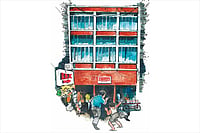It has been a year of many disruptions in the newsroom and a great churning in the media landscape. But personally, it has been a year of seeing differently, stepping out of the role to learn and to understand, and figuring how women see the world and how they look at news. It has been humbling.
It all started with the form of address. I call her Chinki ji. She started this culture at Outlook to address me as Indranil ji and now we often add a ji to anyone we speak to as a form of respect. That’s how we broke the hierarchies.
It has been chaotic and fun. I remember many such instances.
One afternoon, Chinki ji and I were having a casual conversation in her cabin and she told me we should do a cover on Ram. My immediate reaction was "jail jana hai kya" and she said "dariye mat, dar ke aage jeet hai" and then she explained to me over the next hour the concept of "Who is Ram", which I found fascinating and we both agreed to the idea.
I remember that there was a sheet of paper with future story ideas that was pinned to the wall and "Who is Ram" was written on the top. A few weeks later, we published an entire issue on "Who is Ram" and it is one of the year's bestsellers. Readers still ask for that issue. One of our clients whom I meet quite often, and who is a fierce critic of Outlook, told me this is one of the best cover stories of Outlook he has read.
We have learned to agree and disagree and, most importantly, agree to disagree.
A few months ago, Chinki ji designed the substrata cover with an artwork of a woman with her vagina exposed for a story on menstruation and I told her it might be termed insensitive and she agreed. I said let us not print this on the cover, it could be termed as insensitive, and she agreed. Over the last few months, we have had many discussions and we have learned to understand each other’s work. We have argued over many cover stories and I have returned to my cabin smiling not because she accepted what I said but because I understood what the story was. Many stories reminded me of my own encounters. Like the one on Mumbai. I remember how I had first arrived in the city on a rainy night looking for a foothold in the megapolis. We decided to step away from the news cycle only because we felt that we must also tell stories that perhaps will create dialogue and make people see things differently. When she went to Jharkhand, I didn’t know there would be an issue that would talk about the Sarna code. That was an issue that made me understand a few things and a few people better.
Over my three decades of media experience, I have always heard that editorial and management should never see eye to eye. It is a concept of the past. A collaborative relationship with the editor is the need of the hour. There is nothing wrong with it. We should fight, argue, and then arrive at a decision. I must lose the fight most of the time. As the CEO, I should also know how to protect our brand and if I sell my soul, then it is entirely my fault. I must allow for freedom because we also bear a responsibility toward storytelling and journalism.
I feel privileged. Four of Outlook Group’s editors are women and they are all young, open to ideas, happy to explore, and work hard to protect our ethos and our principles. In 2023, we will try to tell more stories, and hopefully, those stories will be remembered because they will bring in the perspective of women and that’s something we have always lacked in the media because journalism largely remains a male-dominated field and by choosing women to head the newsrooms at Outlook, I think I have done my bit. They bring in empathy. That and many other perspectives. Cheers to diversity of thought in the newsroom and not just myth-making deals.
(Indranil Roy is the CEO of Outlook Group.)























